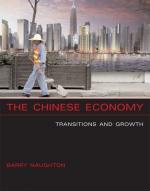|
This section contains 569 words (approx. 2 pages at 300 words per page) |

|
Economic Freedom Post 1953 in China
Summary: Explores China's economic status from 1953-1966. Explains the major industrialization plan called the Five Year Plan. Describes the effect of the plan on the Chinese people, including price controls, rationing, and the end of black markets.
In China, the price paid for their economic status turned out to be too high. In 1953 (before nationalism was fully accomplished) the Chinese started up a major industrialization plan called the Five Year Plan. The Five Year plan emphasized growth in heavy industry, so the few resources that the country had were used for expanding the amounts of railways, steel mills, machinery assembly lines, and power plants; this meant that light industry and consumer goods received limited attention. During the start of the first Five Year Plan, the people of China were expected to make many sacrifices to help with the advancement of the country. The sacrifices that took place were price controls, rationing, and black markets had to come to an end. However, the Five Year Plan was reached (production of steel and iron tripled, the output of coal doubled) and the sacrifices were worth while. The...
|
This section contains 569 words (approx. 2 pages at 300 words per page) |

|


